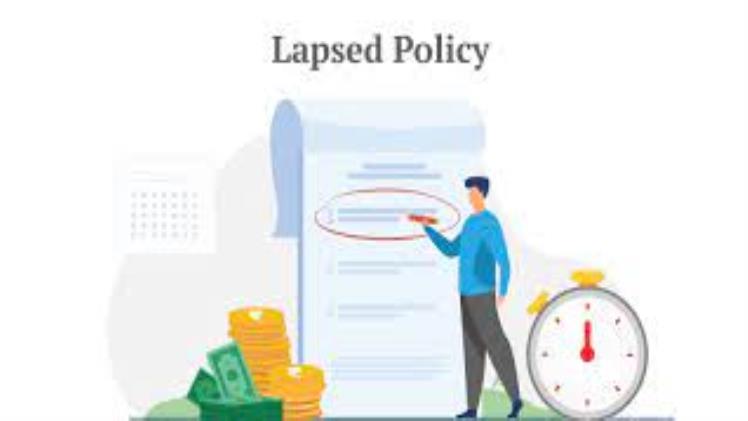Understanding the Basics Of a Lapsed Policy

Introduction
To maintain the validity of your insurance policy, it is imperative to make regular premium payments. If you discontinue these payments, your coverage will lapse, leaving you without any insurance protection. This could expose you to significant medical expenses in the event of a future illness diagnosis if your health insurance lapses. In the case of term insurance plans, your family will not receive any benefits in case of an unfortunate event. Hence, it is crucial to understand the implications of a lapsed policy and take steps to prevent it from occurring.
Definition of a Lapsed Policy
A policy lapses when a life insurance policy is no longer active. It may lapse for a variety of reasons, but the most common reason is non-payment of premiums. If you do not make the payments within the grace period, the policy will lapse.
Most insurance companies provide a grace period beyond the due date to pay the premium. Typically it is 30 days from the due date within which you will have to pay the outstanding premium to keep the policy active.
The policy will also lapse when a life insurance policy expires without being renewed or converted to another type of policy. In the case of your unfortunate demise, the lapsed policy will not pay the death benefit.
Repercussions of a Lapsed Policy
Your term policy lapses when you discontinue paying premiums for a long period. When this happens your policy will be cancelled. Consequently, you forfeit any associated coverage and the ability to file future claims on the policy. A policy that has not earned surrender value and for which premiums have not been paid within the grace period consecutively for two policy years is a lapsed policy.
Is Revival of Lapsed Policy Possible
Reinstating a lapsed policy is indeed possible, but the specific procedures can vary from one insurance company to another. Some insurance companies may insist on going through the process involved to assess your insurability.
Normally, a grace period is provided to pay the premium and keep your policy alive. This grace period is by the IRDAI guidelines and also depends on the type of insurance plan you hold.
It is important to note that the insurer might impose a penalty for the missed premiums before reinstating your coverage. Once you have settled both the missed premiums and any applicable penalties, your policy will be reinstated, and you will be once again eligible for the standard benefits provided by the policy.
Procedure For Revival of Lapsed Policy
To revive a lapsed life insurance policy, there are several essential steps to follow. Here is a guide on how to go about it:
- Get in Touch with Your Life Insurance Company: Initiate the process by reaching out to your life insurance provider. Inform them of your intention to reinstate your policy.
- Review Your Policy Documents: Take a moment to review your policy documents. Familiarise yourself with the terms and conditions, as well as any specific requirements for reinstatement.
- Prepare a Written Request: The insurer may ask you to submit a written request for reinstatement. Ensure your request includes all necessary details and your intent to continue the coverage.
- Settle Overdue Premiums: Address any outstanding premium payments that have lapsed. The insurer will typically expect you to clear these overdue amounts.
- Resume Timely Premium Payments: Commit to paying your ongoing premiums on time to maintain your policy’s active status and ensure uninterrupted coverage.
After you have completed these steps, the life insurance company will evaluate your case to determine whether they can reinstate your policy. Remember that each insurance company may have slightly different procedures, so it is essential to communicate directly with your provider to understand their specific requirements for policy reinstatement.
Tips To Avoid Policy Lapse
The key to avoiding a policy lapse is ensuring timely payment of your premiums. Here are some practical methods to help you consistently pay your insurance premiums on schedule:
- Consider a Single-Premium Policy: Opt for a single-premium policy that requires a one-time upfront payment. With no periodic payments, you need not remember due dates. This eliminates the risk of a policy lapse due to missed premiums.
- Set Up Auto-Debit: Arrange for automatic premium payments from your bank account or debit/credit card. As long as your account or card has sufficient funds, this method guarantees uninterrupted payments.
For policies with scheduled premium payments:
- Calculate and know the premium amount in advance, with a term plan calculator.
- Create reminders to ensure you make premium payments on time. Utilise calendars, apps, or alarms to prompt you before the due date.
- Stay aware of your policy’s expiration date and renew it well in advance to prevent a lapse.
- Contact your insurance company and choose to receive email or SMS reminders, helping you stay informed about premium due dates.
By following these strategies, you can safeguard your insurance coverage and minimize the risk of a policy lapse due to missed premium payments.
Conclusion
Keeping a term policy alive is very crucial as a lapsed policy can lead to serious consequences. It may leave you without coverage making you vulnerable to financial risks. To avoid policy lapses, timely premium payments, exploring revival options, and staying informed about policy terms are imperative. Being proactive is essential to maintain insurance protection and financial security.



